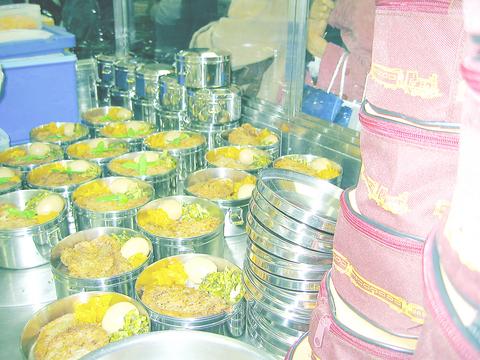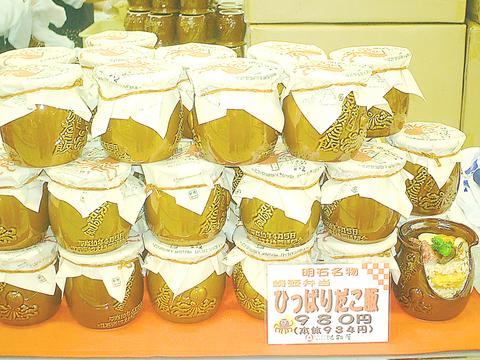A combination of pork chops, cabbage and rice gave Taiwan's often-absent and much-maligned presence on the international stage a flavorsome boost last week, when Taiwan Railway's classic pork chop and vegetable lunchbox (台灣懷舊排骨菜飯便當) became the first international participant to take part in an annual lunchbox show in Tokyo.
Organized by the Japanese hotel and department store chain, Keiouko (

PHOTO COURTESY OF TAIWAN RAILWAY
Attracting huge crowds, the lunchboxes on show are not your run-of-the-mill Styrofoam-packaged variety. Not only do railway stations and mass-transportation companies from across Japan tempt the crowds with regional delicacies, but fancy packaging is also an important aspect of the show.

PHOTO COURTESY OF TAIWAN RAILWAY
Companies use ornately handcrafted bamboo boxes and clay pots looking more like vases than something you'd put your lunch in, to vie for custom, out-sell their rivals and become, quite literally the hottest box in town.
Initially invited to participate in last year's event, Taiwan Railway's Catering Service Department (
While not participating in the event, Chen Ching-piao (
"It being our anniversary year, we were inundated with calls from people who remembered the railway lunchboxes of the 1950s," recalled the catering manager.
"So we decided to produce a limited edition of 1,000, package them in a commemorative aluminum box and sell them on Taiwan Railway's anniversary (鐵路節) on June 8."
All of which proved rather more popular than initially expected. Within three-hours of the railway company's announcing it had produced a limited edition bien dang with fancy packaging and filled with the taste of yesteryear, the company had been inundated with phone calls from people eager to purchase a retro-lunchbox.
And so, packaged in a fancy aluminum container and comprising rice, a pork chop, cabbage and an egg, the Taiwan Railway representative lunchbox was born.
According to Chen, its use of oil from the cooked pork, locally produced cabbage and the presence of dried shrimps in the rice ensured that the lunchbox met with the highest standards and possessed a truly Taiwanese flavor.
With the recipe for success secured, Taiwan Railway began preparing for the event earlier this month. Filling 7,500 aluminum lunch boxes with its special classic pork chop and vegetable meal in readiness for the event that kicked off last Thursday; a day that took Chen's breath away.
"I'd heard the event was popular, but there were huge crowds. You couldn't use the stairwell as a line of people packed it from the venue's basement-one level to the seventh floor where the show was being held," continued Chen.
Made with relatively inexpensive ingredients, Taiwan's entrant in Japan was far from cheap. Priced at the equivalent of NT$450, Taiwan's bien dang was in fact the most expensive lunchbox at this year's show -- its Japanese counterparts averaged NT$350.
Not that this deterred hoards of hungry Japanese from swamping the Taiwan Railway's bien dang stall within minutes of the event's official opening. It did come as somewhat of a surprise for Chen and his fellow Taiwan Railway representatives, however. While expecting some interest they were shocked, yet proud, of what actually happened.
Within 15 minutes of the show opening at 10am on Jan. 9, all 400 Taiwan Railway lunchboxes prepared for that day had been sold.
This was repeated the following day, when all 500 lunchboxes sold out within minutes of the show's opening its doors. And day three was no different, with a total of 700 Taiwan Railway bien dangs being sold long before noon.
"We obviously didn't expect to sell out all 400 that quickly on the first day. And when we sold 500 on the second day and even more on the third day I was amazed," said Chen. "I think the secret of our success lays in the fact that the [lunchbox] is simple yet flavorsome."
The lunchbox has proven so popular that Japanese news reports have been filled with interviews with exasperated visitors who had arrived at the event only to discover that Taiwan's lunchbox had sold out hours before.
Missing the opportunity to sample Taiwan's classic pork chop and vegetable lunchbox, one elderly female Tokyo resident was quoted as explaining that she'd be "getting extra early the following day so as to be able to dine on a Taiwan Railway bien dang."
While Tokyo residents looking for that Taiwanese taste of yesteryear have to set their alarm clocks for ungodly hours, locals have it a bit easier. Due to the lunchbox's runaway success in Japan, Taiwan Railway has launched a special Year End Party Lunchbox (
Costing NT$300, however, Taiwan Railway's lunchbox probably won't become a participant in the ongoing "bien dang wars" being fought out between the nation's connivance stores and more recently McDonalds.

This is the year that the demographic crisis will begin to impact people’s lives. This will create pressures on treatment and hiring of foreigners. Regardless of whatever technological breakthroughs happen, the real value will come from digesting and productively applying existing technologies in new and creative ways. INTRODUCING BASIC SERVICES BREAKDOWNS At some point soon, we will begin to witness a breakdown in basic services. Initially, it will be limited and sporadic, but the frequency and newsworthiness of the incidents will only continue to accelerate dramatically in the coming years. Here in central Taiwan, many basic services are severely understaffed, and

Jan. 5 to Jan. 11 Of the more than 3,000km of sugar railway that once criss-crossed central and southern Taiwan, just 16.1km remain in operation today. By the time Dafydd Fell began photographing the network in earnest in 1994, it was already well past its heyday. The system had been significantly cut back, leaving behind abandoned stations, rusting rolling stock and crumbling facilities. This reduction continued during the five years of his documentation, adding urgency to his task. As passenger services had already ceased by then, Fell had to wait for the sugarcane harvest season each year, which typically ran from

It is a soulful folk song, filled with feeling and history: A love-stricken young man tells God about his hopes and dreams of happiness. Generations of Uighurs, the Turkic ethnic minority in China’s Xinjiang region, have played it at parties and weddings. But today, if they download it, play it or share it online, they risk ending up in prison. Besh pede, a popular Uighur folk ballad, is among dozens of Uighur-language songs that have been deemed “problematic” by Xinjiang authorities, according to a recording of a meeting held by police and other local officials in the historic city of Kashgar in

It’s a good thing that 2025 is over. Yes, I fully expect we will look back on the year with nostalgia, once we have experienced this year and 2027. Traditionally at New Years much discourse is devoted to discussing what happened the previous year. Let’s have a look at what didn’t happen. Many bad things did not happen. The People’s Republic of China (PRC) did not attack Taiwan. We didn’t have a massive, destructive earthquake or drought. We didn’t have a major human pandemic. No widespread unemployment or other destructive social events. Nothing serious was done about Taiwan’s swelling birth rate catastrophe.